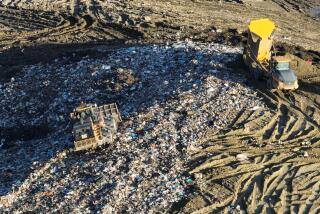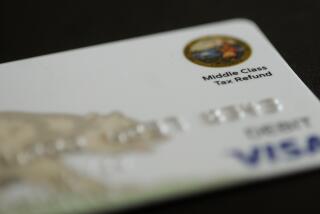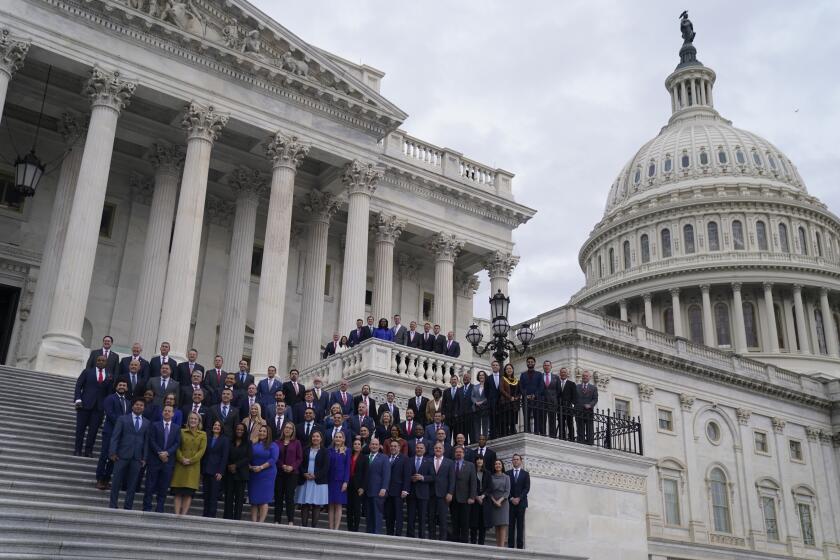Rampant recycling fraud is draining California cash
Just over 8.5 billion recyclable cans were sold in California last year. The number redeemed for a nickel under California’s recycling law: 8.3 billion.
That’s a return rate of nearly 100%.
That kind of success isn’t just impressive, it’s unbelievable. But the recycling rate for certain plastic containers was even higher: 104%.
California’s generous recycling redemption program has led to rampant fraud. Crafty entrepreneurs are driving semi-trailers full of cans from Nevada or Arizona, which don’t have deposit laws, across the border and transforming their cargo into truckfuls of nickels. In addition, recyclers inside the state are claiming redemptions for the same containers several times over, or for containers that never existed.
The illicit trade is draining the state’s $1.1-billion recycling fund. Government officials recently estimated the fraud at $40 million a year, and an industry expert said it could exceed $200 million. It’s one reason the strapped fund paid out $100 million more in expenses last year than it took in from deposits and other sources.
“The law says California has to make it easy to recycle … so anyone with a devious mind, it’s so easy, they can just go right in,” said Los Angeles County Sheriff’s Deputy Dave Chapman, who has investigated fraud rings in recent months.
Under the state’s 25-year-old recycling law, California charges consumers a deposit on most beverage containers sold within its borders. Anyone who brings empty containers back to one of about 2,300 privately run recycling centers can collect 5 cents for most cans and bottles and 10 cents for larger containers.
Only products sold in California are eligible. But a can is a can — and many recycling centers in California aren’t that interested in where they come from.
Hence the influx from out of state. Last summer, the state Department of Food and Agriculture counted all vehicles driving into the state with used beverage containers through 16 border stations. The three-month tally was 3,500, including 505 rental trucks filled to capacity with cans.
Officials with the state Department of Justice said they have filed approximately 10 criminal cases this year against fraud rings bringing in cans from outside California.
Investigators looking into one case sometimes stumble across another.
In the spring of 2010, special agents Jose Soto and Joe Somanek, part of the Justice Department’s recycling fraud unit, were driving east on Interstate 8 to tie up some details in a case in Arizona.
Around 5 a.m, they were drinking coffee and making plans for the day when a white Ford pickup and trailer sped past them, heading west. Suspecting the truck might be carrying cans, the agents flipped a U-turn and followed it more than 150 miles to San Diego, where it pulled into Ace Recycling. The driver and his passenger unloaded 21 large bags full of cans, were paid by the owner and headed back to Yuma.
The suspects made the same journey at least three more times over the next few weeks. Officials said that fraud ring brought in at least $189,000 worth of cans before they were caught.
Ultimately, the owner of Ace Recycling, Michael Barshak, and several others pleaded guilty to grand theft and unlawful recycling.
Eleven states have container redemption programs, and experts believe some level of fraud exists in each. “Seinfeld” fans will recognize the scheme: Two characters once conspired to drive a mail truck full of empty bottles from New York, where they could be redeemed for 5 cents each, to Michigan, where they could fetch 10.
The problem is particularly challenging — and costly — in California. This is the only state in the region besides Oregon with a deposit program, making it a magnet for recycling fraud. And it is the only state besides Hawaii to directly administer the program through private recycling centers.
Other states have beverage distributors or sellers collect the deposits and pay the redemption costs, so they — and not the state — are responsible for the money. But grocery stores and markets opposed that approach in California, which opted to have private recycling centers take in the material. The state reimburses the centers for what they spend on redemption costs, based on their account of what they take in by weight.
The centers, which make their money by selling the material for scrap value and sometimes by collecting additional fees from the state, have a financial incentive to maximize the amount of material they take in, not to look for fraud.
State officials say recycling centers in California are required to take reasonable precautions: They are not allowed, for instance, to buy more than 500 pounds of aluminum or 2,500 pounds of glass from any one person in any given day.
But fraud rings find ways around the law — hiring people to return the cans in small bundles at numerous centers, for example. Investigating such cases is time consuming and expensive: It’s not illegal per se to drive cans across the border, so officers must follow the cans into the state, stake out the locations where the cans are broken down into smaller loads, and then follow the smaller loads to recycling centers.
To help identify people bringing cans into California, Gov. Jerry Brown signed a law last month that will require those importing more than 25 pounds of aluminum or plastic or 250 pounds of glass to declare at the border what their purpose is and the source and destination of the material.
Importers aren’t the only problem. Recycling centers themselves may actively engage in fraud by seeking reimbursement for more than they are entitled to. A recent court case alleges that employees at one of the state’s largest trash companies did just that.
In a lawsuit and whistle-blower complaint, Brian McVeigh, a former supervisor at Recology in San Francisco, said workers made more than $1 million in fraudulent claims a year. One part of the alleged scheme, he said, was pretending that cans it had picked up from commercial and residential customers had actually been turned in to its recycling center; the state often provides bigger reimbursements when materials are acquired that way. McVeigh claims he was fired when he tried to get the company to investigate.
A judge dismissed the wrongful-termination suit, and McVeigh has appealed. His state whistle-blower suit is ongoing.
Recology spokesman Adam Alberti denied McVeigh’s allegations and said he was terminated for cause before he ever raised whistle-blower complaints.
CalRecycle — the state’s Department of Resources Recycling and Recovery, which does administrative reviews, not criminal investigations — looked into the matter and found “multiple violations” of state recycling laws, according to a letter it wrote to Recology in 2010. Among them: that Recology failed to keep adequate records, failed to properly inspect loads of recycled materials and did not always follow a requirement to take down the names of people it claimed had brought in large quantities of recyclable material.
CalRecycle itself has come under scrutiny. A 2010 report from the California state auditor found that the agency did not ensure fraud tips were followed up on. From 2005 to 2010, the report found, CalRecycle logged 295 calls to its fraud tip line. Only 17 of those resulted in an investigation; officials could not say what happened with the other 278.
The state review also found that the agency did not always follow up on audits of beverage distributors that were supposed to be paying deposits into the state’s recycling fund.
In 2010, the agency had a backlog of reports from beverage distributors and manufacturers so severe, it was owed $10 million, a CalRecycle spokesman said. Since then, the backlog has been reduced and it is owed an estimated $3 million.
John Halligan, CalRecycle’s head of recycling enforcement, said his agency now analyzes data from recycling centers’ claims in order to detect fraud. This year, CalRecycle has removed 19 recycling centers from the program and launched reviews of 256 others.
Some centers complain that they too are victims of fraud, and that the state should not lump them in with the rings that illegally import containers.
But Halligan said spotting fraud should not be that difficult for the centers. The vast majority of people turning in cans bring in less than 10 pounds at a time.
“When someone comes in two times a week with 480 pounds, you should know” that something is not right, he said.
More to Read
Start your day right
Sign up for Essential California for news, features and recommendations from the L.A. Times and beyond in your inbox six days a week.
You may occasionally receive promotional content from the Los Angeles Times.






